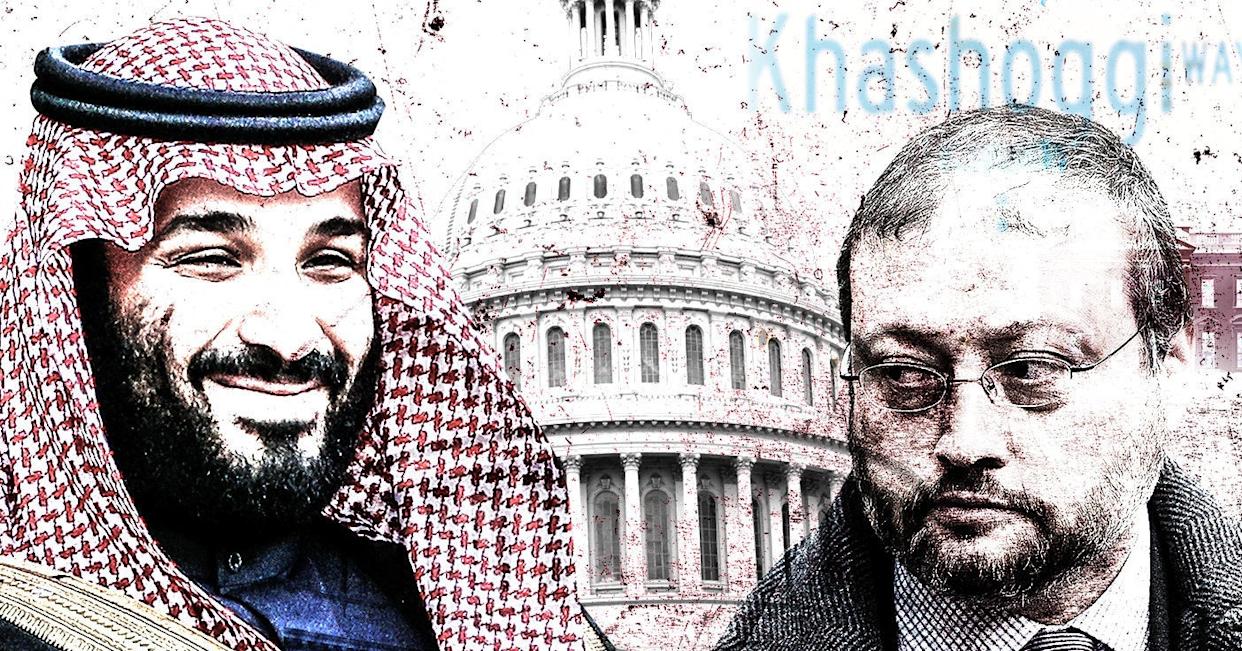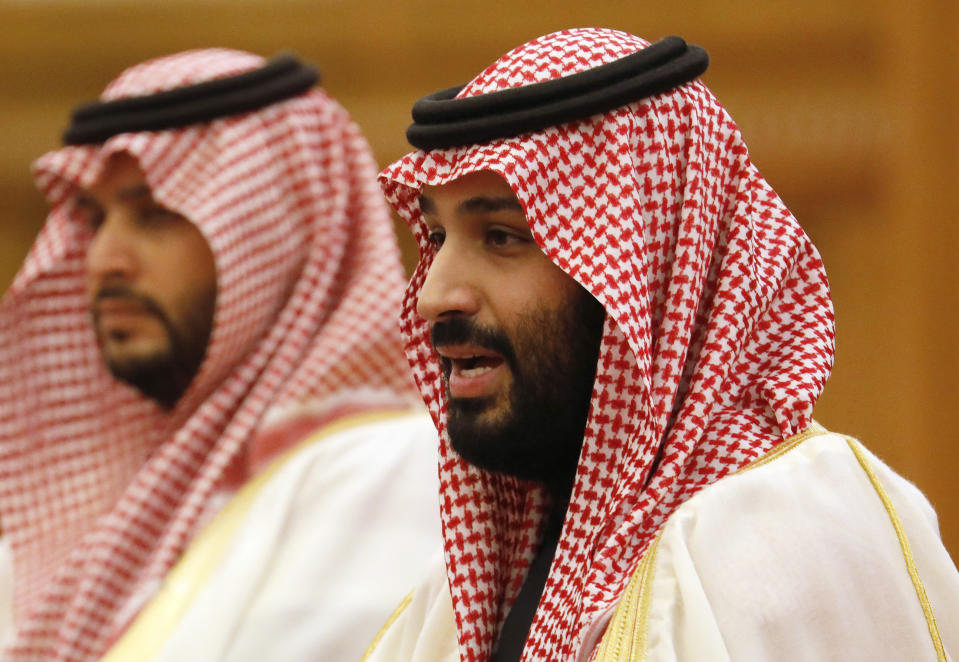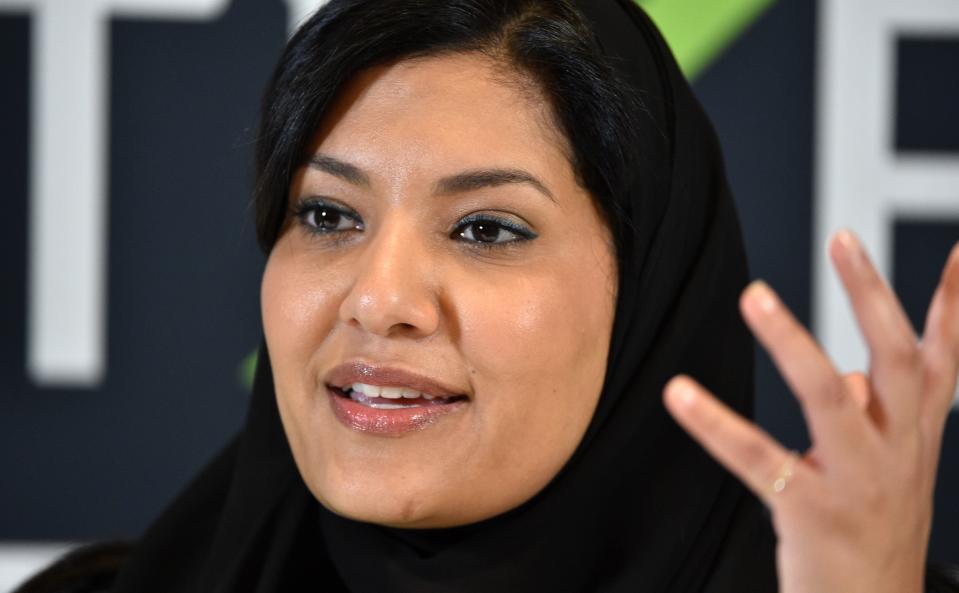Saudis return to Washington scene after Khashoggi fallout

WASHINGTON — In the immediate aftermath of the murder of Washington Post columnist Jamal Khashoggi, Saudi Arabia’s army of well-paid lobbyists and PR experts stepped away from public view, with some even dropping their oil-rich client, particularly as evidence for the killing pointed toward the kingdom’s leadership.
But several months later, after a noticeable lack of public admonition from the White House, the Saudis appear to be testing the waters on a public comeback, via high-profile international trips, diplomacy and engaging the policy community in Washington, D.C. And the message is clear: Saudi officials are declaring that Crown Prince Mohammed bin Salman, who the U.S. intelligence community has linked to Khashoggi’s murder in the Saudi Consulate in Turkey, is here to stay, perhaps for the next half-century and beyond.
Speaking at an event his organization hosted earlier this month, Ali Shihabi, the head of the Arabia Foundation and a former investment banker in Saudi Arabia, said that his sources in the Saudi government have told him Crown Prince Mohammed and his grip on power are safe. “The issue of his performance has been sorted out. … I think his position is quite permanent,” said Shihabi, whose Washington think tank is close to the Saudi royal family.
The Arabia Foundation refuses to reveal its donors, but its registered counsel previously represented the Saudi government.
Responding to criticisms of the crown prince and his misadventures — ranging from the Khashoggi murder to the detainment and alleged torture of high-ranking Saudi officials at the Riyadh Ritz-Carlton — Shihabi conceded that “a lot of mistakes have been made.” However, he argued that Crown Prince Mohammed is the best the West will get, and that idealists in Washington should think about what the alternative to his flawed attempts at reform might look like.
“Appreciate what you have and work with it,” he said. “We have to deal with reality, not idealism.”
Shihabi’s comments appear to reflect the emboldened approach the Saudi government has taken over the past month. In February, a poster created by the Saudi Ministry of Foreign Affairs depicted the crown prince and his father, King Salman, quoting Foreign Minister Adel al-Jubeir declaring “our leadership is a red line” — a sentiment he proclaimed in an interview with the BBC in November.
Saudi Arabia also appears to be taking steps to improve its image in Washington, including appointing its first female ambassador to the U.S. — Princess Reema bint Bandar Al Saud, who grew up in D.C. and has many connections in Washington. She’s replacing Prince Khalid bin Salman, who reportedly directed Khashoggi to the consulate in Istanbul.
Lobbyists working on behalf of Saudi Arabia are also becoming more public again. The Denver-based lobbying firm Brownstein Hyatt Farber Schreck have been meeting with lawmakers and calling journalists to discuss, among other things, proposals within Congress to withdraw support for the Saudi-led coalition in Yemen, according to recent Foreign Agent Registration filings. Brownstein Hyatt Farber Schreck also hosted a fundraiser last week for senators, including members of the Foreign Relations Committee, though Lara Day, a spokeswoman for the firm, told Yahoo News “there’s no connection between” its work for Saudi Arabia and the event.

The Saudi government also appears to be getting support from the Trump administration; the White House announced last week that Jared Kushner was in Saudi Arabia in late February and met with the crown prince.
But perhaps one of the surest signs Riyadh is rebuilding bridges in Washington is the willingness of former officials and think tank representatives to attend events linked to the Saudis. Dennis Ross, a retired ambassador who was involved in Middle East peace negotiations over the years, told Yahoo News he chose to participate in the panel because he knew the debate would be robust.
“I think debating issues is always the right path,” he wrote in an email to Yahoo News. “Certainly, the foundation knew it would be creating a forum where tough criticisms of Saudi behaviors would be made — and yet it sought it anyway,” he continued. “I found that interesting and decided to take part.”
During the panel, Ross described Crown Prince Mohammed’s recent actions related to Khashoggi as “reckless,” though he did praise the recent transformations he’s seen in the country within the last couple months, including men and women sitting together in restaurants.
“The people that I talked to there, if something were to happen to MBS, the dark forces would come back,” he said. “But there’s also a desire for more checks on his power.”
Ross joined Karen House, a former senior vice president of Dow Jones, and Aaron Miller, a vice president at the Wilson Center and former diplomat.
Miller was more critical of both recent Saudi behaviors and the lackluster White House response. He argued that U.S. lawmakers’ rebuke of the kingdom, including the possibility that Congress would withdraw U.S. support for the war in Yemen, goes “beyond politics” and is not just about anti-Trump sentiment. He compared the Khashoggi murder to the Tiananmen Square massacre of protesters in 1989, when the U.S. halted high-level discussions and canceled ongoing arms sales. “We haven’t imposed our own red lines,” he said.

A congressional aide who spoke to Yahoo News agreed. “I think one of the key issues is that this administration remains supportive and close to MBS. You have Kushner recently visiting him there, not rebuking their actions, not enforcing the Magnitsky sanctions,” he said. But in Congress “there’s still a lot of anger on both sides of the aisle.”
“It does seem like they are making a new effort to try and rebrand themselves, with the new ambassador,” the aide continued. But without accountability for Khashoggi and changes in the war in Yemen, “there are going to be some serious issues between the Saudis and Congress.”
That view appeared to be backed up during last week’s confirmation hearing for retired U.S. Army Gen. John Abizaid, who has been nominated by the Trump administration to be ambassador to Saudi Arabia. Senators from both sides of the aisle blasted the crown prince for his role in the death of Khashoggi and pressured Abizaid to discuss his plans for reform, in Saudi Arabia and beyond its borders, like in war-torn Yemen.
Abizaid, for his part, promised to hold the Saudis accountable while maintaining the important relationship.
“It’s the role of the United States to make sure the Saudis know what we stand for,” he told senators on the Foreign Relations Committee. “I will ensure that those ideals, those values, those mutual interests are conveyed as clearly as I can. I look forward to working with them, not in an adversarial way.”
And while Saudi Arabia may be confident now, it is already looking toward the 2020 presidential campaign, which could end President Trump’s stay in the White House.
“I think that Riyadh has gotten a lot of negative vibes from the U.S.,” Shihabi said at the panel, adding that it’s affected the psychology of the leader.
“Ultimately, you will only be able to tell as time goes by,” he says. “I see them as very concerned.”
Read more from Yahoo News:
Women divided by race over key issues, but with areas of overlap
Maverick Republican William Weld looks to run against Trump's 'malignant narcissism'
The Army's killer drones: How a secretive special ops unit decimated ISIS
The Soviets wanted to infiltrate the Reagan camp. So, the CIA recruited a businessman to bait them.


